We at Mormonism Research Ministry generally watch all that we can of General Conference to get a pulse for what the Salt Lake hierarchy continues to teach and emphasize. This, along with consulting church-published curriculum, is a far better way to discern what Mormonism teaches and what Mormons believe than to simply take the words of a savvy apologist or BYU professor at face-value. Here are my notes as I listen to the conference.
Boyd K. Packer
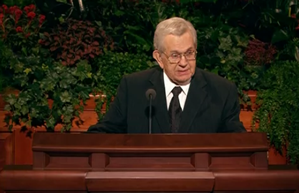 Those who preach the gospel must be ordained. Other Christians churches don’t have the never-ending clergy resources like the Mormon Church does. Speaker feels his own inadequacy at times even in his own office. No one member is deemed more worthy than another in the eyes of God. Common members have the same access to revelations for family as apostles do. Members receive revelation particular to their office.
Those who preach the gospel must be ordained. Other Christians churches don’t have the never-ending clergy resources like the Mormon Church does. Speaker feels his own inadequacy at times even in his own office. No one member is deemed more worthy than another in the eyes of God. Common members have the same access to revelations for family as apostles do. Members receive revelation particular to their office.
Richard Edgley
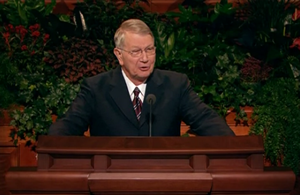 There is an advantage to the “congregational microscope” many members live under, the closeness members have, particularly in the compassionate ministry of each other’s needs. The Lord’s organization is fully adequate to deal with member’s most dire spiritual and temporal needs. When members experience being served in a time of suffering, they will then be more equipped to help others.
There is an advantage to the “congregational microscope” many members live under, the closeness members have, particularly in the compassionate ministry of each other’s needs. The Lord’s organization is fully adequate to deal with member’s most dire spiritual and temporal needs. When members experience being served in a time of suffering, they will then be more equipped to help others.
Mary N. Cook
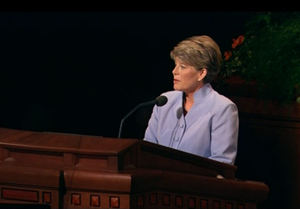 The Lord is depending on you to bring the blessings of the gospel to your family. Your example and pattern of righteousness has profound impact on the family. Study. Get a good education. Pay tithing. Attend meetings regularly. As you “live worthily” and regularly take the sacrament, and commit to patterns of righteousness, you and your family will be blessed. Participate in good family traditions like family home evening. Strengthen your family relationships. Uppermost in Cook’s mind is family goals like spending eternity with her family. If one’s family upbringing gave bad example, then break that bad pattern. Family is central to Creator’s plan for the eternal destiny of individuals.
The Lord is depending on you to bring the blessings of the gospel to your family. Your example and pattern of righteousness has profound impact on the family. Study. Get a good education. Pay tithing. Attend meetings regularly. As you “live worthily” and regularly take the sacrament, and commit to patterns of righteousness, you and your family will be blessed. Participate in good family traditions like family home evening. Strengthen your family relationships. Uppermost in Cook’s mind is family goals like spending eternity with her family. If one’s family upbringing gave bad example, then break that bad pattern. Family is central to Creator’s plan for the eternal destiny of individuals.
Enrique R. Falabella
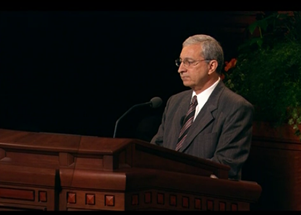 Why are we members of the only true church? Tells story of asking father to fix his worn shoes. His father shined his shoes, but his toe still stuck through. Missionaries later taught him of gospel and eternal families. After joining the church his father brought family to temple. [Cries thinking of family journey to temple.] Felt peace of having eternal family. Priesthood provides special power to bless. How often we hear a sweet child’s voice asking for father’s priesthood blessing, and in the morning the child says he slept well. Only the LDS Church offers such priesthood power to families. Christ paid for my sins, illnesses, and sorrows. His sweat were as great drops of blood. If I live according to Christ’s precepts I can enjoy all his other promised blessings. Because of royal priesthood and internal testimony of Spirit of the living Christ he is member of the LDS Church.
Why are we members of the only true church? Tells story of asking father to fix his worn shoes. His father shined his shoes, but his toe still stuck through. Missionaries later taught him of gospel and eternal families. After joining the church his father brought family to temple. [Cries thinking of family journey to temple.] Felt peace of having eternal family. Priesthood provides special power to bless. How often we hear a sweet child’s voice asking for father’s priesthood blessing, and in the morning the child says he slept well. Only the LDS Church offers such priesthood power to families. Christ paid for my sins, illnesses, and sorrows. His sweat were as great drops of blood. If I live according to Christ’s precepts I can enjoy all his other promised blessings. Because of royal priesthood and internal testimony of Spirit of the living Christ he is member of the LDS Church.
Spencer J. Condie
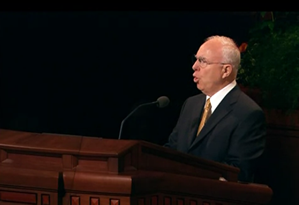
First principle is faith in Christ. This means faith in his divine heritage and his having created the earth. And in his atonement, through which our sins may be cleansed. Faith in Christ is assurance that he appeared to Joseph Smith for restoration. Faith is believing his teachings and promises and partaking of his divine nature. Many promises are proclaimed by God’s prophets, and God’s word will not pass away, but will all be fulfilled, whether by his own voice or by the voice of God’s servants (prophets). When we receive any blessing, it is by obedience to that law upon which it is predicated. God is bound by his promises when people do what God says to do. The Lord promises forgiveness of sins when we confess them and forsake them [this isn’t good news if you have Spencer W. Kimball’s concept of “forsake” in mind!]. The windows of heaven will be opened to those who pay a faithful tithe. Great treasures of knowledge to those who observe Word of Wisdom. Divine guidance to those who feast on scriptures. Holy Ghost will be a companion if we unceasingly let virtue garnish our thoughts. Those sealed in temples and live their covenants will receive God’s full glory. Don’t disconnect obedience with the fulfillment of promises. Components of faith include patience, long-suffering, enduring to the end. Earth life is journey. [Cries when thinking of God’s promise to Abraham and Sarah to give son, Isaac]. [Cries when thinking of Rachael’s birth of Joseph and Benjamin.] As God remembered Rachael, God will remember you. Millions of those of Joseph and Benjamin have received the gospel.
Dieter Uchtdorf
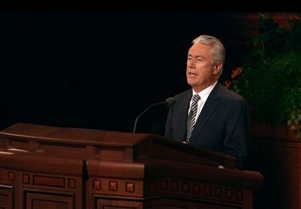 Good tidings are sounding to us from each nation. World generally focuses on bad news. Scripture does speak of commotion at end times. But we need not live in worry and apprehension. Let us rejoice. In winter of 1944 his mom took her children and fled. Would reunite with father at grandparents. In middle of this despair they learned of LDS Church and its healing message. Brought hope and joy. Our membership in Church is reason for rejoicing. Gospel has power to lift you above burdens and weaknesses. Gospel is good tidings. All truth and light is embraced in gospel. It is God’s work and glory to bring about eternal life and immortality.
Good tidings are sounding to us from each nation. World generally focuses on bad news. Scripture does speak of commotion at end times. But we need not live in worry and apprehension. Let us rejoice. In winter of 1944 his mom took her children and fled. Would reunite with father at grandparents. In middle of this despair they learned of LDS Church and its healing message. Brought hope and joy. Our membership in Church is reason for rejoicing. Gospel has power to lift you above burdens and weaknesses. Gospel is good tidings. All truth and light is embraced in gospel. It is God’s work and glory to bring about eternal life and immortality.
Atonement makes redemption possible. All will be unconditionally redeemed from death, and all those who accept and obey gospel will be redeemed from sins. Only in and through the name of Christ is the gospel. Core elements of gospel found in all scriptures, but most clearly are found in Book of Mormon and revelations to Joseph Smith. Smith followed pattern of plainness and simplicity of gospel. We must accept principles of gospel: Faith, relying wholly on the merits of Christ. Repentance, change of mind, broken heart and contrite spirit. Baptism by immersion for remission of sins and covenant to keep the commandments of Christ. Laying on of hands for gift of Holy Ghost, also called “baptism by fire”. Spirit helps us obey Christ and endure to the end. Enduring to the end is remaining faithful to laws and ordinances of gospel. Doing this throughout life is fundamental requirement of the gospel. This is different from other Christian groups who teach we must simply believe and confess that Jesus in the Christ. But Jesus clearly declares that if we keep his commandments and endure to the end you shall have eternal life. Gospel is a gospel of joy. Adam fell that men might be, and men are that they might have joy. Enduring to the end is accomplished through personal discipline and following commandments. This includes paying tithes and offerings, honoring temple covenants, serving faithfully in church callings, integrity, making homes strong places of defense and refuge, loving honoring spouses and children.
Jesus wants you to succeed. When you are down, remember that Jesus is head of church. He has promised, “Come unto me, all ye that labour and are heavy laden, and I will give you rest.” our faithful membership in the church and divine powers of gospel will bless you to endure joyfully to the end.
Thomas S. Monson
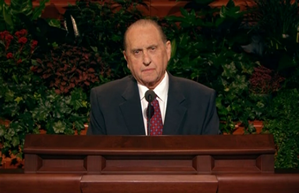 Tells story of Arthur Patton, a childhood friend who enlisted in the military. Youth is a very special time in life. Arthur died and Monson tried to comfort his mother, testifying to her that Arthur still lives. To understand death, we must understand the meaning of life. Man was in the beginning with God. Quotes Jeremiah 1:5 to support pre-existence. We grow from helpless infancy to childhood to reflective maturity. We experience a scope of feelings in mortality. None is exempt from death. We know that those who die return to their Creator. God won’t forsake them. Quotes John 11:25-26: “I am the resurrection and the life: he that believeth in me, though he were dead, yet shall he live: And whosoever liveth and believeth in me shall never die.” Then quotes John 14:2-3: “In my Father’s house are many mansions: if it were not so, I would have told you. I go to prepare a place for you… I will come again, and receive you unto myself; that where I am, there ye may be also.” Then quotes some Mormon scriptures. Monson testified to Arthur’s mother that we would see Christ again someday. Later, she was invited to listen to General Conference and listened to a message by Monson in 1969. He later received a letter from her thanking him for the comforting words. She said she was now at peace concerning Arthur. God provided for her as a widow. Jesus is knocking and speaking. Let’s open the door to the Lord to receive his help.
Tells story of Arthur Patton, a childhood friend who enlisted in the military. Youth is a very special time in life. Arthur died and Monson tried to comfort his mother, testifying to her that Arthur still lives. To understand death, we must understand the meaning of life. Man was in the beginning with God. Quotes Jeremiah 1:5 to support pre-existence. We grow from helpless infancy to childhood to reflective maturity. We experience a scope of feelings in mortality. None is exempt from death. We know that those who die return to their Creator. God won’t forsake them. Quotes John 11:25-26: “I am the resurrection and the life: he that believeth in me, though he were dead, yet shall he live: And whosoever liveth and believeth in me shall never die.” Then quotes John 14:2-3: “In my Father’s house are many mansions: if it were not so, I would have told you. I go to prepare a place for you… I will come again, and receive you unto myself; that where I am, there ye may be also.” Then quotes some Mormon scriptures. Monson testified to Arthur’s mother that we would see Christ again someday. Later, she was invited to listen to General Conference and listened to a message by Monson in 1969. He later received a letter from her thanking him for the comforting words. She said she was now at peace concerning Arthur. God provided for her as a widow. Jesus is knocking and speaking. Let’s open the door to the Lord to receive his help.
M. Russell Ballard
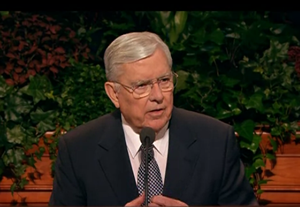
There is increased interest in the church. We have 53,000 missionaries to address doctrinal questions. There is a difference between interest and curiosity.
“Those who are curious in this general way deserve clear and accurate information that comes directly from those of us who are members. So they do not have to rely on the incomplete answers, half-truths, or false statements that may come from the media or other outside voices. The many misunderstandings and false information about the Church are somewhat our own fault for not clearly explaining who are and what we believe.”
The public affairs committee on which Ballard serves has learned the need for simple statements that explain the basics of modern Mormon beliefs. Members may want to prepare their own talking points. Here are four subjects to help others get a basic understanding of the church
1. Facts. Explain the term Mormon. Church was restored in 1830 and is lead by prophet Gordon B. Hinckley. There are 13,000,000 members, 6 million of which are in the U.S. which makes Mormonism 4th largest Christian denomination in America, and one of the fastest growing Christian faiths in the world. Members pay 10% tithe. Local congregations are led by unpaid volunteers with men and women in positions. Mormons serve in important positions in government, law, media, sports, entertainment, etc.
2. Faith. Mormons are committed Christians with strong traditional values. Emphasize that along with Articles of Faith. We believe in the eternity of the soul, returning to the Father of our spirits, that Jesus is our personal savior and example. Christ’s sacrifice is commemorated on Sunday morning services.
“We accept as fellow Christians all who believe Jesus Christ to be the Son of God and the savior of all mankind. Many Christians do not understand that we have much common ground with them. Joseph Smith taught that Jesus Christ is the core of our belief and everything else is an appendage to it. The name of our church is The Church of Jesus Christ of Latter-day Saints.”
The original church was lost, along with priesthood authority and apostles and prophets, which needed to be restored through Mormonism. We use the Bible, the Book of Mormon which supports and authenticates the ministry of Christ.
3. Family. Theology and lifestyle are family-centered. Mormons have deep commitment to marriage as defined by union between one woman and one man. “Polygamy a, limited practice in the early pioneer days of the church, was discontinued in 1890, some 117 years ago.” Families are encouraged to do family home evening. Auxiliary for women, youth, and children provide religious instruction, opportunities for service, sports, scouting, etc. Focus on extended family, as with genealogy. Highest and most sacred ordinances related to families, dead and alive.
4. Fruits of the restored gospel. Jesus said, by their fruits you shall them. Church should be judged by fruits. Practicing Mormons are defined by those who attend church and temple regularly. Practicing Mormons are healthier and live longer. Word of wisdom helps with this. Divorce rate far lower with those who go to temple. Education level is higher than national average. Over 70,000 members volunteer for missions and humanitarian services. Church donates to humanitarian programs, both money and labor.
Keep your talking points on the church simple and short. Growing interest in the church provides more opportunities for learning about the church. Missionaries know how to answer more questions and lead people to conversion and baptism. The power of personal testimony often ignites within others an interest in the church.
Joseph B. Wirthlin
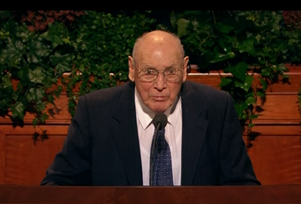 What qualifies define us best as LDS members? Early Christians were enthusiastic converts, many attracted to the preaching of the gospel. But saints in Corinth were contentious, proud, some taking others into court. Paul wanted them to be unified. He spoke of the importance of love. Without it other things don’t do much if anything. When Pharisees asked Jesus which of the commandments was greatest, he replied that it was to love God with everything, and love one’s neighbor. If we love, we are known of God. Joseph taught that love is a chief characteristic of deity. Those who love are anxious to bless human race. Love is beginning, middle, and end of discipleship. It leads us to grandeur and glory of eternal life. Joseph Smith reflected this well by possessing the principle of love. Joseph Smith once treated a boy hospitably. Sometimes love isn’t dramatic, but rather are simple acts of kindness and caring. God sees us a the glorious beings we are capable of becoming. The gospel refines us into men and women for eternities. The more love, the more joy. Spend time with the Lord. When we love God obedience becomes a delight. Teach others to love the Lord and fellow man. To learn to love, reflect on the life of the savior, the greatest example of love. [Quotes first half of John 3:16.] Because God loves us he has provided apostles and prophets and the guidance of the Holy Ghost and the scriptures.
What qualifies define us best as LDS members? Early Christians were enthusiastic converts, many attracted to the preaching of the gospel. But saints in Corinth were contentious, proud, some taking others into court. Paul wanted them to be unified. He spoke of the importance of love. Without it other things don’t do much if anything. When Pharisees asked Jesus which of the commandments was greatest, he replied that it was to love God with everything, and love one’s neighbor. If we love, we are known of God. Joseph taught that love is a chief characteristic of deity. Those who love are anxious to bless human race. Love is beginning, middle, and end of discipleship. It leads us to grandeur and glory of eternal life. Joseph Smith reflected this well by possessing the principle of love. Joseph Smith once treated a boy hospitably. Sometimes love isn’t dramatic, but rather are simple acts of kindness and caring. God sees us a the glorious beings we are capable of becoming. The gospel refines us into men and women for eternities. The more love, the more joy. Spend time with the Lord. When we love God obedience becomes a delight. Teach others to love the Lord and fellow man. To learn to love, reflect on the life of the savior, the greatest example of love. [Quotes first half of John 3:16.] Because God loves us he has provided apostles and prophets and the guidance of the Holy Ghost and the scriptures.
Note: Wirthlin started out having a tough time reading the teleprompter and then later had some noticeably bad back spasms.
Bruce D. Porter
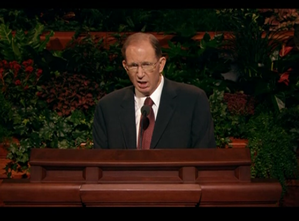 Quotes Kipling (sp?), then points to Psalm 51 where David speaks of a real sacrifice being a broken heart, not just burnt offerings. Mosaic sacrificial system pointed symbolically to the atoning sacrifice of Christ, who alone can reconcile sinful man with God. Jesus taught others in the New World to offer up a broken heart, and promised they would be baptized by fire and with the Holy Ghost. What is a broken heart and why is it considered a sacrifice? Jesus, utterly sinless, nonetheless walked through life with a broken heart and contrite spirit. Jesus taught, “I am meek and lowly of heart.” Jesus submitted to Father in going to be sacrificed. His example shows a broken heart is an eternal attribute of godliness. With it we recognize our dependence on him. It is a sacrifice of pride in all forms. The broken heart can be shaped by the Master. Broken heart and contrite spirit are “pre-conditions” of repentance. It means to experience a godly sorrow which works repentance. Our hearts ache with sorrow and we yearn to feel at peace with God. This condition brings submissiveness to God’s commandments, without resistance or resentment. With it true repentance can occur, and the atonement will take effect. The penitent will experience power of the Holy Spirit, which gives peace of conscience and reconciliation with God. God also tells us to rejoice. A broken heart serves as a divine shield against temptation. When we yield our hearts to the Lord, the attractions of the world lose their luster. With a broken heart comes gratitude for Christ’s atonement. In the Garden of Gethsemane he bore the burden of the sin of humanity. At the cross he poured out his soul unto death, and his heart broke with love for God’s children. When we remember the savior our hearts will break too. God binds up the broken-hearted.
Quotes Kipling (sp?), then points to Psalm 51 where David speaks of a real sacrifice being a broken heart, not just burnt offerings. Mosaic sacrificial system pointed symbolically to the atoning sacrifice of Christ, who alone can reconcile sinful man with God. Jesus taught others in the New World to offer up a broken heart, and promised they would be baptized by fire and with the Holy Ghost. What is a broken heart and why is it considered a sacrifice? Jesus, utterly sinless, nonetheless walked through life with a broken heart and contrite spirit. Jesus taught, “I am meek and lowly of heart.” Jesus submitted to Father in going to be sacrificed. His example shows a broken heart is an eternal attribute of godliness. With it we recognize our dependence on him. It is a sacrifice of pride in all forms. The broken heart can be shaped by the Master. Broken heart and contrite spirit are “pre-conditions” of repentance. It means to experience a godly sorrow which works repentance. Our hearts ache with sorrow and we yearn to feel at peace with God. This condition brings submissiveness to God’s commandments, without resistance or resentment. With it true repentance can occur, and the atonement will take effect. The penitent will experience power of the Holy Spirit, which gives peace of conscience and reconciliation with God. God also tells us to rejoice. A broken heart serves as a divine shield against temptation. When we yield our hearts to the Lord, the attractions of the world lose their luster. With a broken heart comes gratitude for Christ’s atonement. In the Garden of Gethsemane he bore the burden of the sin of humanity. At the cross he poured out his soul unto death, and his heart broke with love for God’s children. When we remember the savior our hearts will break too. God binds up the broken-hearted.
Eric W. Kopischke
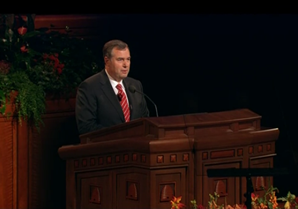 Sister missionaries left a spiritual thought after dinner. They left a fresh Book of Mormon with colored pencils. Eric’s family noticed this as method suggested in Preach My Gospel. This book has revolutionized missionary work. Missionaries learn principles and then use their own words to express them. We must be one with the missionaries, and understand each other, particularly how missionaries do their work. We must adopt their mindset. We can do this by becoming acquainted with Preach My Gospel. This is “marvelous” guide. It can help us in our own day to day life, and develops strong testimonies. It addresses basics like recognizing the Spirit, the role of the Book of Mormon, developing Christ-like attributes. This book has powerful ideas and insights. Read it to learn how you can help missionaries. Strong invitations to act are helpful. We too should read this book. Youth who prepare for missions should read this book. Invite missionaries to teach lessons from it. Ask your children to teach lessons from it. “I bear witness that this missionary guide is inspired of God.” Missionaries and members much “speak the same language”.
Sister missionaries left a spiritual thought after dinner. They left a fresh Book of Mormon with colored pencils. Eric’s family noticed this as method suggested in Preach My Gospel. This book has revolutionized missionary work. Missionaries learn principles and then use their own words to express them. We must be one with the missionaries, and understand each other, particularly how missionaries do their work. We must adopt their mindset. We can do this by becoming acquainted with Preach My Gospel. This is “marvelous” guide. It can help us in our own day to day life, and develops strong testimonies. It addresses basics like recognizing the Spirit, the role of the Book of Mormon, developing Christ-like attributes. This book has powerful ideas and insights. Read it to learn how you can help missionaries. Strong invitations to act are helpful. We too should read this book. Youth who prepare for missions should read this book. Invite missionaries to teach lessons from it. Ask your children to teach lessons from it. “I bear witness that this missionary guide is inspired of God.” Missionaries and members much “speak the same language”.
Michael J. Teh
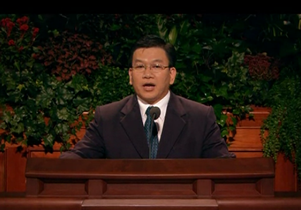 One of the most important questions every asked was a question by Cain, “Am I my brother’s keeper?” This deserves contemplation.
One of the most important questions every asked was a question by Cain, “Am I my brother’s keeper?” This deserves contemplation.
We need to enlarge our circle of influence. We shouldn’t discriminate. Much of what needs to be done can be done through our relationships. Quotes Screwtape Letters. God puts loving people in our lives. Struggled over whether to go on mission. His sister never gave up in encouraging him to go. He stands on the shoulders of good people. Sharing the gospel message is an important way to serve non-Mormons. A neighbor of Michael’s who was often drunk listened to the gospel message by LDS missionaries and became a great man. We should be open to opportunities to share the gospel. Michael’s mother loved to help others in need. Great things come from small, daily, comforting, encouraging acts. May always we find opportunities to serve.
Keith K. Hilbig
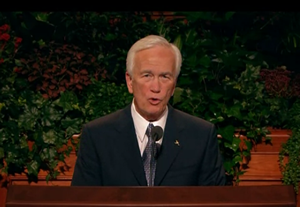 We must be careful not to hinder or quench the Spirit. “The role of the Spirit, the Holy Ghost, is essential in every season of our mortals lives.” The Father promised that through the atonement and Christ’s resurrection we all might return to God’s presence and inherit the blessings of eternal life in the highest degree of the Celestial Kingdom. Heavenly Father provides that all who meet the prerequisites of faith, repentance, baptism, with a companion and guide, the Holy Ghost. The path to eternal life is an upward incline, with increasing wisdom and understanding. We dare not quench the promptings of the Holy Ghost. We often live below our privileges. The Spirit enlightens or enlivens the inner man. We feel strengthened. We possess enthusiasm. We yearn to become holier. [Hilbig then quotes Stephen Robinson’s and Robert Millet’s evangelical rhetoric on grace. Not. Hilbig himself instead goes on to say this:]
We must be careful not to hinder or quench the Spirit. “The role of the Spirit, the Holy Ghost, is essential in every season of our mortals lives.” The Father promised that through the atonement and Christ’s resurrection we all might return to God’s presence and inherit the blessings of eternal life in the highest degree of the Celestial Kingdom. Heavenly Father provides that all who meet the prerequisites of faith, repentance, baptism, with a companion and guide, the Holy Ghost. The path to eternal life is an upward incline, with increasing wisdom and understanding. We dare not quench the promptings of the Holy Ghost. We often live below our privileges. The Spirit enlightens or enlivens the inner man. We feel strengthened. We possess enthusiasm. We yearn to become holier. [Hilbig then quotes Stephen Robinson’s and Robert Millet’s evangelical rhetoric on grace. Not. Hilbig himself instead goes on to say this:]
“Do you wish to know the price to be paid for the privileges that are offered after we have received the Holy Ghost? The price is not a predetermined or fixed amount. Rather it is determined by each of us individually. If you set your payment, which is your personal effort, very low, you may not be able to avail yourself of all the Spirit has to offer. You may even quench the Spirit. However if you set your personal contribution high, you will reap an abundant harvest from the Spirit. The payment I reference is of course not money, rather it is a greater commitment to and involvement in personal spiritual endeavors and behaviors… Whatever level of spiritual development each of us may presently have, there always exists a higher level within our reach. Time is a most precious asset. Would you consider investing more of your time in the things of eternity in order to merit the constant companionship of the Holy Ghost and to benefit more fully from his influence? If your answer is yes, the initial offering in this pursuit of deeper spirituality is an intensified desire to receive greater inspiration, to become more holy. When this desire fills our hearts, we will eagerly increase the price we pay for heaven’s help.”
The Spirit will quicken us and give us understanding. Let us pray frequently and fervently. “We draw nearer to the Savior as we keep his commandments with exactness.” When we attend the temple as often as we can we depart with heightened understanding. As we truly seek the Spirit, we shall benefit more from his working.
Jeffrey R. “Taking The Gloves Off” Holland
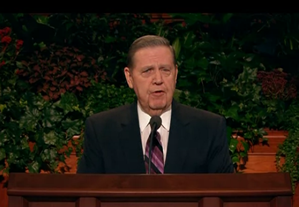 While people marvel at the church we don’t want anyone to wonder if we’re Christians. Much controversy has swirled around our view of the Godhead and continuing revelation, leading to an open canon. We don’t need to be apologists on this, but we wish to be understood. Our first article of faith is we believe in God the Eternal Father, his Son Jesus Christ, and in the Holy Ghost. [With a feisty, forceful assertiveness Holland says:]
While people marvel at the church we don’t want anyone to wonder if we’re Christians. Much controversy has swirled around our view of the Godhead and continuing revelation, leading to an open canon. We don’t need to be apologists on this, but we wish to be understood. Our first article of faith is we believe in God the Eternal Father, his Son Jesus Christ, and in the Holy Ghost. [With a feisty, forceful assertiveness Holland says:]
“We believe these three divine persons, constituting a single divine Godhead, are united in purpose, in testimony, in manner, in mission. We believe them to be filled with the same godly sense of mercy and love, justice and grace, patience, forgiveness, and redemption. I think it’s accurate to say, we believe them to be one in every significant and eternal aspect imaginable, except believing them to be three persons combined in one substance, a trinitarian notion never set forth in the scriptures, because it is not true. Indeed no less a source than the stalwart Harper’s Bible Dictionary records that, ‘The formal doctrine of the Trinity as it was defined by the great church councils of the fourth and fifth centuries is not to be found in the New Testament.’ So any criticism that The Church of Jesus Christ of Latter-day Saints does not hold the contemporary Christian view of God, Jesus, and the Holy Ghost, is not a comment about our commitment to Christ, but rather a recognition—accurate, I might add—that our view of the Godhead breaks with post-New Testament Christian history, and returns to the doctrine taught by Jesus himself.” [There’s so much more I’d love to directly quote here, but I’m not going to keep typing all of it. Check the manuscript on LDS.org when it available.]
Constantine convened a council in 325, addressing the growing alleged triune view of God. After more councils this was called the Nicene Creed, with later reformulations such as the Athanasian Creed. These and later creeds declared God to be immanent, dwelling outside space and time, absolute, abstract, unknowable, without passions, without body parts, incomprehensible, distinct persons but one God. Such a formulation for divinity is truly incomprehensible [crowd laughs]. Little wonder that a fourth century monk says, “Woe is me, they’ve taken their God away from me…” How can we worship or strive to be like one who is unknowable and incomprehensible? It is not our purpose to demean the doctrines of any religion. We extend the same respect to their religions as we ask for ours. If someone says we aren’t Christians because we don’t hold of 4th century view of divinity, then what about those before, even the eye-witnesses of Christ? We point to many Biblical examples showing God, Jesus, and the Holy Ghost are three different beings. Jesus said his father was greater than him. Jesus prayed to the Father. We are not guilty of polytheism, but rather of being in accordance with the teaching of Christ. Quotes Philippians 2, where Jesus thought not it robbery to be equal with God.
We also believe God is embodied, and this is criticized. Why is all of Christianity centered around the incarnation, atonement, resurrection? If having a body isn’t needed or desirable, why did Jesus redeem his body? Any who dismiss the concept of an embodied God dismiss the resurrected Christ. Jesus is our savior and redeemer. He created heaven and earth and everything in them. He was born of a virgin mother. He had power over death, being divine. Jesus conquered the grave physically and hell spiritually. He resurrected and appeared. Only by relying on his merits, mercy, and everlasting grace can we gain eternal life. Father and Son appeared as embodied beings to Joseph Smith. That marked the return to the true gospel.
Russel M. Nelson
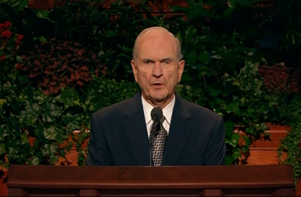 Many are wondering about our history and doctrine. Among them are some who cast aspersions against the Book of Mormon. We believe it to be the word of God. Witness is important concerning the word of God. Divine doctrines are confirmed by more than one scriptural witness. The Bible and Book of Mormon both teach Jesus is the Son of God, that he atoned for sins, that he died and resurrected. The Book of Mormon was written that you may believe the Bible. Each refers to the other. Each evidences that God lives and speaks revelation to prophets. Book of Mormon rescores (?) and underscores doctrines like tithing and priesthood. Book of Mormon is meant to restore plain and precious truths lost from the Bible. The scriptural story of Jesus Christ is a two-hemisphere story. Nelson quotes, D&C 84: “[B]ecause you have treated lightly the things you have received… [you] shall remain under this condemnation until [you] repent and remember… the Book of Mormon and the former commandments which I have given… [and] do according to that which I have written… ” The Book of Mormon reaffirms and clarifies the Bible. Examples: Isaiah passage. Two-“sticks” Ezekiel passage. Book of Mormon reaffirms sermon on the mount. Book of Mormon mentions resurrection more than the Bible. Book of Mormon clarifies need of the Holy Ghost and the laying on off hands. Paul referred to the three degrees of post-mortal glory. This glimpse is clarified by another scriptural witness. Nelson then quotes the D&C [which is odd because the wider context is a discussion of the Book of Mormon]. The word “atonement” appears only once in the KJV. In the Book of Mormon it appears thirty-nine times. John spoke of the New Testament angel, Moroni, declaring the gospel. Nelson then quotes some Book of Mormon passages that use heavy Biblical phraseology [maybe Nelson should reconsider Blake Ostler’s expansion theory of the authorship of the Book of Mormon?]. Christ wants to embrace us in his loving arms. The change of those who apply the scriptures is seen.
Many are wondering about our history and doctrine. Among them are some who cast aspersions against the Book of Mormon. We believe it to be the word of God. Witness is important concerning the word of God. Divine doctrines are confirmed by more than one scriptural witness. The Bible and Book of Mormon both teach Jesus is the Son of God, that he atoned for sins, that he died and resurrected. The Book of Mormon was written that you may believe the Bible. Each refers to the other. Each evidences that God lives and speaks revelation to prophets. Book of Mormon rescores (?) and underscores doctrines like tithing and priesthood. Book of Mormon is meant to restore plain and precious truths lost from the Bible. The scriptural story of Jesus Christ is a two-hemisphere story. Nelson quotes, D&C 84: “[B]ecause you have treated lightly the things you have received… [you] shall remain under this condemnation until [you] repent and remember… the Book of Mormon and the former commandments which I have given… [and] do according to that which I have written… ” The Book of Mormon reaffirms and clarifies the Bible. Examples: Isaiah passage. Two-“sticks” Ezekiel passage. Book of Mormon reaffirms sermon on the mount. Book of Mormon mentions resurrection more than the Bible. Book of Mormon clarifies need of the Holy Ghost and the laying on off hands. Paul referred to the three degrees of post-mortal glory. This glimpse is clarified by another scriptural witness. Nelson then quotes the D&C [which is odd because the wider context is a discussion of the Book of Mormon]. The word “atonement” appears only once in the KJV. In the Book of Mormon it appears thirty-nine times. John spoke of the New Testament angel, Moroni, declaring the gospel. Nelson then quotes some Book of Mormon passages that use heavy Biblical phraseology [maybe Nelson should reconsider Blake Ostler’s expansion theory of the authorship of the Book of Mormon?]. Christ wants to embrace us in his loving arms. The change of those who apply the scriptures is seen.
